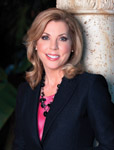 Jacqueline Whitmore (www.etiquetteexpert.com) is an etiquette expert, the author of Poised for Success: Mastering the Four Qualities That Distinguish Outstanding Professionals, and a Certified Speaking Professional who travels internationally to present seminars ranging in topic from techno-etiquette to cross-cultural protocol. She’s also a popular source for media outlets, including The New York Times, O: The Oprah Magazine, ABC’s 20/20 and CNN’s Anderson Cooper 360°.
Jacqueline Whitmore (www.etiquetteexpert.com) is an etiquette expert, the author of Poised for Success: Mastering the Four Qualities That Distinguish Outstanding Professionals, and a Certified Speaking Professional who travels internationally to present seminars ranging in topic from techno-etiquette to cross-cultural protocol. She’s also a popular source for media outlets, including The New York Times, O: The Oprah Magazine, ABC’s 20/20 and CNN’s Anderson Cooper 360°.
Whitmore shared some of her greatest tips on planning meetings overseas with Meetings Focus International.
MFI: What are some examples of common faux pas meeting planners should beware of when planning overseas?
Whitmore: International business is done between people, not between businesses. Therefore, know if the people come from a culture that is more business-focused or more relationship-focused.
Brush up on your conversation skills. Good conversation starters include popular sports, attractions and activities in the country where you will be traveling. Steer clear of topics revolving around politics and religion.
Be aware of any upcoming holidays where offices might be closed.
Always use proper titles when introducing yourself to others and referring to someone in conversation. Only call someone by his/her first name after they’ve given you permission.
Know greeting customs and gender roles within the country where you are conducting business. For example, when greeting foreigners, the Chinese may follow their bow with a handshake.
Understand that people observe time differently. In the U.S. and in some parts of Europe people are very punctual while in other countries punctuality may not be practiced.
MFI: What mistakes are commonly made because of cultural differences, and how can you rectify things?
Whitmore: Be careful of word choice and hand gestures. In some cases you may want to hire a translator to clarify meaning and confirm that your message comes across as intended.
Be aware of different dining customs. For example, if you are the guest of honor, you may be served something unfamiliar (a local delicacy, for example) and may be expected to eat it before anyone else at the table starts.
Know the significance of certain colors. For example, in Brazil and Mexico, purple is the color of death so avoid bringing purple flowers as a gift. White also symbolizes death in many cultures.
If you make a faux pas, humbly apologize immediately. You may be able to salvage the relationship if you don’t cover up your mistakes.
MFI: What advice do you have to help first-time planners facilitating a meeting abroad?
Whitmore: Give attendees a map of the city so they have a sense of where they will be, how big the city is, how public transportation functions there and other practical city tips.
Learn a few basic phrases. Most cultures respond positively when someone makes an effort to communicate with them in their native language. Carry a translation guide or translation phone app with you.
When planning meals, sample the local cuisine in advance just to be certain it is acceptable and agreeable to your attendees. Ask yourself: “Will most of the attendees’ stomachs easily adapt to this ethnic food?”
Send out the agenda and dress code information in advance so people have time to adequately prepare. When in doubt, dress appropriately and conservatively. Clothing that is too short, too revealing or tight-fitting may send the wrong signal.
Familiarize yourself with greetings and body language. For example, in the Arab culture its offensive to show the soles of your shoes.
Practice patience. The No. 1 complaint about Americans is that we are impatient.
When speaking to someone who doesn’t speak English well, speak clearly and slowly. Construct your message in groups of short, compact sentences.
Remember that a person’s business card is an extension of him/herself, so review it and handle it with care. If you plan to frequently do business in another country, your cards should be printed with your language on one side and the language of the other country on the other side.
Follow your host’s lead. Be prepared to develop relationships; don’t get to business too quickly.
For more advice from Jacqueline Whitmore, go to www.etiquetteexpert.com.
—Carolyn Blackburn





